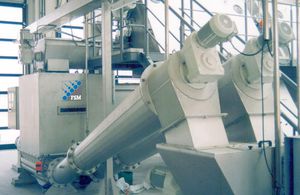
- Production Machines
- Other Manufacturing Equipment
- Drainage screener
- FSM-Frankenberger GmbH & Co. KG
- Products
- Catalogs
- News & Trends
- Exhibitions
Drainage screener TSscrewfor liquidsself-cleaning






Add to favorites
Compare this product
Characteristics
- Applications
- drainage
- Type
- screw
- Material
- for liquids
- Other characteristics
- self-cleaning
Description
The FSM back pressure device is an optional extra which is installed downstream of a screenings washing press to optimise the dry solid matter content (TS).
The FSM screening washing press is synonymous with hygienic and efficient handling of screenings. Waste disposal is a cost factor at every installation – wet screenings are heavy screenings and increase your costs. The septage in the water must be delivered to the subsequent sewage purification processes.
The FSM screening washing press reduces the weight and volume of your screenings and in addition washes out more than 95% of fecal matter.
Functional principle:
The FSM back pressure device is optionally built into the discharge pipe of a screenings washing press. The open section of the discharge pipe is varied by means of a shutter which is operated by a hydraulic cylinder.
The TS content can be set to the required value – a TS value of over 50% can be achieved.
To ensure high operating reliability at high TS values, the current consumption of the screenings washing press drive is monitored and a special drive control prevents high wear of the extruding screw. We thus achieve high performance combined with low operating costs. After leaving the back pressure device, the screenings remain in the discharge pipe and drop into a container or onto a conveyor at the end of the pipe.
Catalogs
FSM Back Pressure Device
2 Pages
Exhibitions
Meet this supplier at the following exhibition(s):

Other FSM-Frankenberger GmbH & Co. KG products
Screenings handling
Related Searches
- Screening unit
- Bulk material screening unit
- Compact screening machine
- Construction screening unit
- Waste screening unit
- Stainless steel sieving machine
- Inclined screening unit
- Process screening machine
- Heavy-duty screening unit
- Drum screening unit
- Liquid sieving machine
- Particle screening machine
- Rotary screening machine
- Self-cleaning screening unit
- Pellet screening unit
- Wet sieving machine
- Spiral screener
- Control sieving machine
- Drainage screener
- Filter screening machine
*Prices are pre-tax. They exclude delivery charges and customs duties and do not include additional charges for installation or activation options. Prices are indicative only and may vary by country, with changes to the cost of raw materials and exchange rates.





